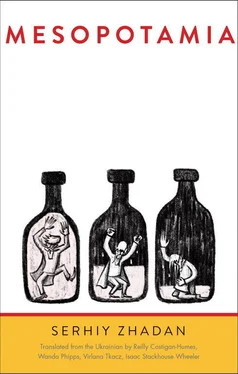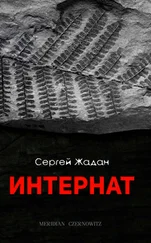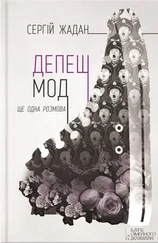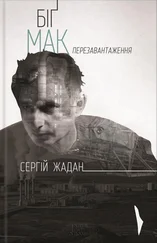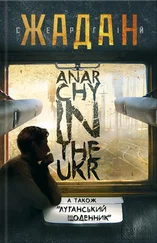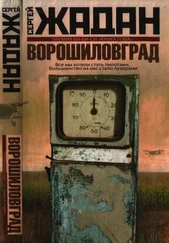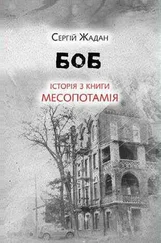“Hey!”
His voice cracked and shattered in the overwhelming silence, but the stranger seemed to have heard it; he stopped and turned around. Thomas paused to think and then charged ahead. Then the stranger bolted, clearly trying to escape. Thomas bolted after him. Heavy footfalls filled the silence. The man ran up to the far wall, hesitated at the intersection up ahead, unsure where to go from there, then hopped off to the left and disappeared around the next corner. Thomas could hear his steps fading away, so he ran to the corner. The stranger was gone. Thomas ran forward, tearing past rows of garages, always hoping to catch a glimpse of the stranger’s flashy clothes, but he had simply disappeared, as though he wasn’t the one stricken by fear, as though he hadn’t hesitated at the crossroads. Thomas was panting, yet he kept running forward, unrelenting, striving to reach the stranger, catch him, and finally figure out what was going on around here. At some point, he felt the path between the garages bend to the left ever so slightly—he must have been running around in circles for some time now. He’d already started thinking about stopping and turning back when his eye suddenly caught an open garage, with a small door visible inside it, also open. He stopped, caught his breath, walked over, and peered inside.
The smell of grease and burnt fur seeped through the darkness farther back as rays of sun poked through and sprawled out across the red, polished surface of an automobile—an old Kopeika. She had clearly given her owner many years of faithful service, but hadn’t quite earned a peaceful retirement—there was something in her past, something for which she was atoning, even after her death. Thomas immediately realized that her death had been a terrible one—she was lying all over that garage, ground up like hamburger. Demons had intercepted that car, tossing it around like a rugby ball for a while and then hurling it into the hot sky over and over again. Chewed-up metal, junked internal components, black burnt rubber, finely shattered glass—the automobile looked like the body of a saint tortured by Roman legionaries. Thomas took a closer look. There was a felt blanket hanging behind it. Swaying in a light, invisible draft, it looked like a dark, heavy sail; evidently there was another unseen exit at the back of the garage. It was worth exploring. Thomas skirted past the dismembered Kopeika, cautiously pushing the felt partition to the side. Sure enough, there it was—another room, cluttered with paint cans and bottles of polish. He stepped forward carefully, saw another door up ahead, and opened it, entering the next room, which was much smaller. There was an office desk in the corner, covered in old, yellowed newspapers. He stepped in and surveyed the space. The next door was tucked away, a tiny hole in the wall, fading like an old scar. Thomas walked over and rammed his shoulder into the door, which wouldn’t give at first, but eventually squeaked open. Hot, concentrated sunlight flooded his vision. Thomas ventured outside, raising a hand to shield his eyes from the painful rays and immediately sensing breathing nearby. He moved his hand away—still too blind to make anything out—crouched, backing out of the sun, and tentatively raised his hand again. He held that position for a bit, unmoving, still feeling a presence nearby and gradually regaining his vision; yellow balls and black planets were bouncing around in his eyes as they teared up and focused again. Thomas stood up. Right in front of him, no more than two steps away, breathing laboriously, dry tongues lolling, stood a pack of stray dogs, sniffing, moaning from the heat and their own exertion. The door slammed shut behind him with a clang of rusty metal. There was no way out. Their empty, hostile eyes aimed at him, the dogs came no closer, but they were clearly readying themselves to pounce on him any moment now and rip his throat out. The top dog, the most battered and muscular of the bunch, had gray fur, a scarred forehead, and a heavy tongue peppered with black dots. Two young hounds—both bow-legged, with tough, yellow coats—were waiting in the wings. Those two looked the most threatening, and they were clearly eager to pounce the instant their leader gave them the order. A bit farther back, behind them, a young bitch with cold fangs was arching her back fiercely, her head held high. A young pup, whose paws were incredibly powerful for a canine its age, was growling next to her, exposing some red spots on its stomach. An old stray with a mangled front right paw, eyes filled with hatred and despair, dried-up saliva around its mouth, and thorns sticking out of its gashed nose was limping off to the side. Yet another dog, young, shiny, and black, stood way in the back. A bit frightened, yet bold and fierce, not particularly worn down or battered and eager to demonstrate his ferocity, the strength of his muscles, the sharpness of his incisors, and the seriousness of his intentions for the only female around. She could feel that, too, but she didn’t let on, turning her back to him and growling, reacting anxiously to each of Thomas’s movements. His head inching forward, the top dog paused and started hoarsely exhaling all of his black aggression; Thomas realized that he was cooked, that everything was just about to go down, and that the leader had signaled to his pack that there was no point delaying any longer—they just had to rip this intruder to shreds. As the leader stretched out toward Thomas and softly dug his paws into the dead clay, Thomas thought, “I’m cooked. I’m really cooked, and nothing can be done about it. I just have to accept things the way they are, even if it’s cruel, even if it’s unfair.” He looked the top dog in the eyes, so he would at least see the blow death landed on him. The top dog observed Thomas with a great deal of reverence, but no concessions would be made—everything must play out the way it’s supposed to; everyone will get what he deserves, nobody will be saved—exceptions are degrading. Thomas gritted his teeth, clenched his fists, and took a half-step forward, preparing himself for a blast of salty dog breath on his throat—then an elderly woman appeared somewhere off to the side. She was tall and had dark skin on her face, a blue men’s jacket on her torso, and heavy shoes on her feet. She was holding countless purses and shopping bags, which she was dragging along the hot clay. Those bags were stuffed with ancient clothing and empty bottles, food she’d fished out of dumpsters, and prehistoric kitchenware—bowls, knives, plates, and spoons. All that stuff rattled and rolled along, and it seemed as though her bones and joints were rattling along, too. Dust had settled around her. She smelled like an apartment where an older person had just died. Her empty gaze rubbed up against Thomas, as though he didn’t even exist and she hadn’t seen him at all. The dogs tensed up and stood still, continuing to growl and gnash their teeth, but their aggression was just riding its own momentum now. They didn’t want to retreat from this victim who had just wandered onto their turf.
“Belshazzar!” the woman called to the top dog with the scarred forehead.
He was set to lurch toward Thomas; however, her voice had a strange effect on him, seemingly paralyzing his faith in himself and restraining his rage. Turning away from Thomas, Belshazzar stretched his muzzle toward the woman, who extended her dark, bony hand, rubbing his busted-up head and then stepping forward. The pack hurried after her, vanishing around the corner and leaving the smell of dry fur behind.
She called him in the early evening and apologized; they agreed to meet. He offered to come by and pick her up right then and there.
“You don’t have to,” Olia answered. “We’ll see each other tomorrow, anyway.” She thought about how men never stuck around for too long. Sometimes she’d notice them and pick them out of a crowd, touching their hands for the first time, peering into their eyes for the first time, remembering their wrinkles, uttering their names, permitting them to stay by her, noting their habits and behavior, listening to how they talked, patiently sitting through stories about their adventures, triumphs, and misfortunes, sharply and firmly thwarting their efforts to learn more about her than she wanted to disclose; she snickered at their bravery, let herself be perplexed and touched by their trusting nature, and harshly quelled their aggression. She adjusted to their breathing, urged them to take decisive action, lost her sense of time with them, left them exposed and alone with their troubles and distorted notions of love and loyalty. She missed them, thought of them, forgot them, refreshed her memory, and recalled everything they’d said to her, all their vows, and everything they did with her. She was resilient enough to never go running back to them and smart enough not to forget them forever, hiding some memento of each and every one of them under her skin—their brimming faith in themselves, their impetuosity, weakness, and unreliability, their caution, fickleness, and piety, their susceptibility to new love. “Those men,” she thought, “were born to protect this city and lead campaigns of conquest in its name. They were brought up to value obedience and restraint. They were taught to endure extreme heat and cold, pain and hunger. They grew to defend the city’s walls or build churches and warehouses, augmenting our city’s riches and glorifying all the saints who watched over it. They’re entrusted with keeping our city’s gas lines and plumbing in working order, taking care of women and children, feeding stray animals, and keeping wild birds away from the fruit trees downtown. Spreading love is their vocation; the gods have opened the heart of each of them, making way for both love and hate, setting them up for endless joy and suffering, so all they can do is love and hope, believe and lose faith, wait and never retreat, express their gratitude and profess their views, lose everything they’ve accumulated and start anew, hoping that this time around love won’t betray them, that death will retreat.
Читать дальше
